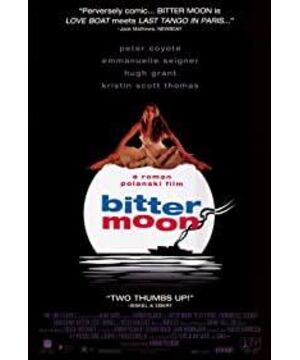[The article is transferred from the public account: the head of the theater group]
Text / Totoro
As a chinchilla with a habit of textual research, this cat always scoffs at the love scenes that appear in the movie.
"Don't watch pure love movies" was one of Ben Mao's consistent movie watching rules, because I felt that they were too fake (serious comments from single cats) and did not conform to Chinchilla's previous cold and realistic aesthetics.
However, if it is mixed with some philosophies of life, it may be possible to take a look.
For example, "Warm and Contain Light", and another example of the "Love Is" trilogy ("Love Before Dawn", "Love When Midnight Comes", and "Love After Sunset and Dusk").
Or it's a combination of love and growth, such as the never-outdated "Pumping Heart".
Of course, there are also extreme loves, such as "Sensual World", "Lust and Caution", and "Bitter Moon" that Totoro is about to mention.
In Ben Mao's eyes, romance films should never only be love .
If a movie only talks about love, it is like swallowing without chewing. Although the stomach is full, the desire to taste is not. Even if physical hunger is gone, spiritual hunger is still there.
This cat not only wants movies to solve the problem of physical hunger, but also wants them to solve the mental hunger.
Therefore, romantic films should not only be love, and ML should not be just ML, otherwise, after the expiration date of both, they will also deteriorate and rot.
Some people have a long shelf life and are willing to hold back their hunger. They only eat a little bit at a time and put them back in the refrigerator after eating, so these people can always survive before the next wave of food arrives.
But some people are impatient, always thinking that they can eat everything in one breath, so they starved to death before the next food came.
So, like greedy people, love dies.
This is also the story of The Bitter Moon.
1 Bitter Moon
The love in "Bitter Moon", in the eyes of Chinchilla, is an interesting depiction of the love process.
The love here is not like the twisted first love that is usually in love, but it is a little twisted, a little crazy, and even a little extreme.
However, the emotion at the beginning is also the product of liberal democracy, which represents the subjective identification with someone. But love occurs only when identification is two-way.
In most cases, these initial feelings are just friendship or unrequited love. Love doesn't really happen until a physical touch brings the two together, willing to share their secrets with each other.
The secret is X love.
They fell in love at first sight, quickly entered the period of love, and frantically explored the secrets of each other's bodies. Some of these scenes were shown in the movie, and some were narrated through Oscar.
Oscar is good at using exploratory writing to visualize his own thoughts of trying to get into Mimi's body. Some bridges make Chinchilla feel that although it is only one or two descriptive sentences, it is far more penetrating than the real scene.
Love cannot escape X love, just like a fish cannot do without water.
In more than one X love scene, Oscar and Mimi , a pair of natural enemies, constantly probed each other's most secret corners.
My Neighbor Totoro likes that "Bitter Moon" takes Nigel and Fiona , a young couple who are experiencing the "seven-year itch" , compared to Oscar and Mimi.
Nigel and Fiona's relationship is as cold as strangers, and the only thing that keeps them together is a marriage.
The relationship between Oscar and Mimi is more complicated. They each have a little fun, but they also destroy each other's emotions all the time.
The former is a dying romance that is still struggling without emotion, while the latter is a love-hate relationship that is alive and dead, and reborn from the dead. But they all have one thing in common - dissatisfaction with the status quo.
In the flashback of the movie, we saw that Mimi, who gave up her dancer status for love, was willing to be an embellishment in Oscar's life, as much as possible to integrate into his "body" and become a part of his body.
But Oscar is a ruthless man. In other words, he prefers "physical pleasure". They fall in love because of X love. When the secret of the body is dissected, even if Mimi is naked, Oscar is no longer interested.
Totoro has heard this explanation before:
Women's love cycle is always relatively slow (men's), they will not fall in love with someone easily, but after falling in love, they will never forget it; while men are opportunists, they fall in love quickly and leave quickly. It is intuition and sexuality that underpin male emotions, while tolerance and understanding underpin female emotions.
This statement may not be entirely correct, but it does illustrate some problems.
Like Oscar in the movie, when the love and climax are over, he quickly gives up this relationship. But as a woman, Mimi has nowhere to go. She can't go back to her previous life, and she can't be the simple dancer she used to be. Meeting Oscar changed her and ruined her.
Ultimately, Mimi still wants to stay with Oscar, even without any credits.
At this point in the story, it stands to reason that the movie should have a decent ending, but this is only halfway through. And the second half of the most exciting movie is the part that makes Totoro the most recognized part of this movie.
2 The orgasm of love
Later, Mimi chose to give up her former self, change her identity, and launch a crazy revenge against Oscar.
This is a very interesting design for this film.
It also raises the question: If love has gone to the grave, what are two people trying to maintain?
"Sensual World" is bolder, knowing that love is coming to an end, so let it end before the climax of love!
As a result, Abe Sada cut off Ishida Yoshizura's sexual organs and took the symbol representing X's love as his own.
In this regard, Ben cat's cognition has always been divided.
As a serious and serious research cat, this cat thinks this is a kind of morbid possession. But it is a metaphor and a symbol to integrate the symbols of representation and love into one—symbolizing that X love from beginning to end is not something that can’t be grasped by nothing, but that it is certain and has a trajectory.
But as an emotionally conscious single cat of the right age, I feel that such a climax of X love and the revenge drama in "Bitter Moon" are quite sad - sad hero and heroine, sad society, sad love, everything is So bitter that it can only be ended in the most extreme way.
As a skeptic who is often schizophrenic, Ben cat doesn't know how to answer this kind of question.
Everyone has a different understanding of it, and the result of different understandings is that everyone is sure of their own understanding, which also makes multi-dimensional answers a set.
People all regard this kind of thinking as a symbol, replacing a movie and a kind of thought. Even if it is as illusory as the illusion behind the marriage tomb, it actually provides strength.
Totoro believes that this kind of power is subjective, just as Abe thinks that he will get everything if he gets sexual organs, Mimi is married to Oscar, and even intends to break Oscar into a disability, nothing more than wanting to have Oscar completely, Let him be inseparable from her and become the nightmare of his life.
The sadness of "Bitter Moon", in Chinchilla's heart, is the contradiction between the current "bitter possession of lovers" and the "disappearance of the climax of X love" in the past.
When you have it, you don't care about losing it, and when you lose it, you use all means to get it back, but things have already happened, and people can't go back to the past time like an alarm clock, so when the pain comes, there is no other way but to bear it.
3 The shelf life of love
However, most loves are probably the same in the end, and we are all familiar with this look: family love.
The affection of each other is probably the final end of the emotion. It is no longer love itself, but family affection.
This is true of "Love and Blind Date", and the same is true of "Long Bridge Last Dream". One is to keep the promise and wait for decades, and the other is to give up the great love of love because of the responsibility to the family.
No one is complete, but it is also because of incompleteness that everyone looks different and treats love differently.
The love period is probably a suspended sentence for the death sentence of love. If you behave well, your sentence may be reduced or even exempted. But if you don't behave well, then the death penalty will obviously come to you right away.
After the climax of love, you will be indifferent, irritable, love, hate, deliberately ignore your lover's feelings, torture him, curse him, or even leave him. Couples are the most prone to problems during this time, because everything you already know about each other—both strengths and weaknesses—especially the flaws, will be magnified in your mind countless times, forcing you to curse them.
Because there is no longer love, love has become hatred, an outlet for venting, and the den of love has become the devil's lair and the lover's prison.
Therefore, the most important thing is not how to love, but how to maintain love.
Love has a shelf life. No matter how deep the love is, you can't avoid the trough period of love. Just like Oscar and Nigel, after the shelf life of love, they are addicted to sensuality and can't extricate themselves. This is not because of their love. It's not deep enough, but love is not eternal. Some people interpret it as family affection, and some people interpret it as hatred.
However, the emotion of procrastination needs to be cut off, not retaliation and revenge, and if Mimi and Oscar's emotion can be decisively split before the low point, then nothing after that will happen.
But everything happened, or rather, what should have happened happened, and it was a tragedy and a romantic love.
What you see is what it is.
This is probably the most valuable thing that "Bitter Moon" brings to the audience.
View more about Bitter Moon reviews











